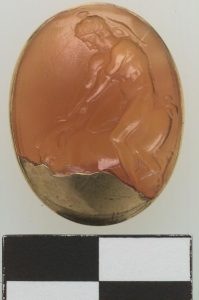Theseus overcomes the sow Phaea
τῆς δὲ Κορινθίας ἐστὶ γῆς καὶ ὁ καλούμενος Κρομυὼν ἀπὸ τοῦ Κρόμου τοῦ Ποσειδῶνος. ἐνταῦθα τραφῆναί φασι Φαιὰν, καὶ τῶν λεγομένων Θησέως καὶ τὸ ἐς τὴν ὗν ταύτην ἐστὶν ἔργον.
Sisyphus buries Melicertes and founds the Isthmian games
προϊοῦσι δὲ ἡ πίτυς ἄχρι γε ἐμοῦ πεφύκει παρὰ τὸν αἰγιαλὸν καὶ Μελικέρτου βωμὸς ἦν. ἐς τοῦτον τὸν τόπον ἐκκομισθῆναι τὸν παῖδα ὑπὸ δελφῖνος λέγουσι: κειμένῳ δὲ ἐπιτυχόντα Σίσυφον θάψαι τε ἐν τῷ ἰσθμῷ καὶ τὸν ἀγῶνα ἐπ᾽ αὐτῷ ποιῆσαι τῶν Ἰσθμίων.
- Map
- Pre Reading
- Post Reading
- Culture Essay
Now that Pausanias has provided a concise account of Corinthian history, he is ready to resume the journey to Corinth. The liminal territory between poleis can be a treacherous no-man’s land. We have already met Theseus along the road from Attica to the isthmus where he tossed the robber Sciron into the sea (1.44.8). Now we learn of two more of his famous deeds, the defeat of the wild boar Phaia and, in the next section, the brigand Sinis who stretches travelers between two pine trees.
In this section, Pausanias presents part two of Melicertes’ story: his tomb. After his mother Ino throws herself and her son into the sea to escape the wrath of her husband Athamas, Melicertes is carried to dry land by a dolphin. The hero Sisyphus discovers the body and buries the boy on the isthmus.
Become familiar with the vocabulary of place: Topography Vocabulary-Pre-reading-RoadtoIsthmia.
There are four indirect statements in this section. Find at least three of them and identify the main verb of speaking, thinking or perceiving introducing each one, as well as the accusative and infinitive. Then rewrite each one as a direct statement, keeping the same tense.
[pods name=”culture_essay” slug=”414″ field=”post_title”]
[pods name=”culture_essay” slug=”414″ field=”essay_excerpt”]

Photograph by Maria Daniels, courtesy of the Museum of Fine Arts, Boston, March 2000. Boston 21.1205